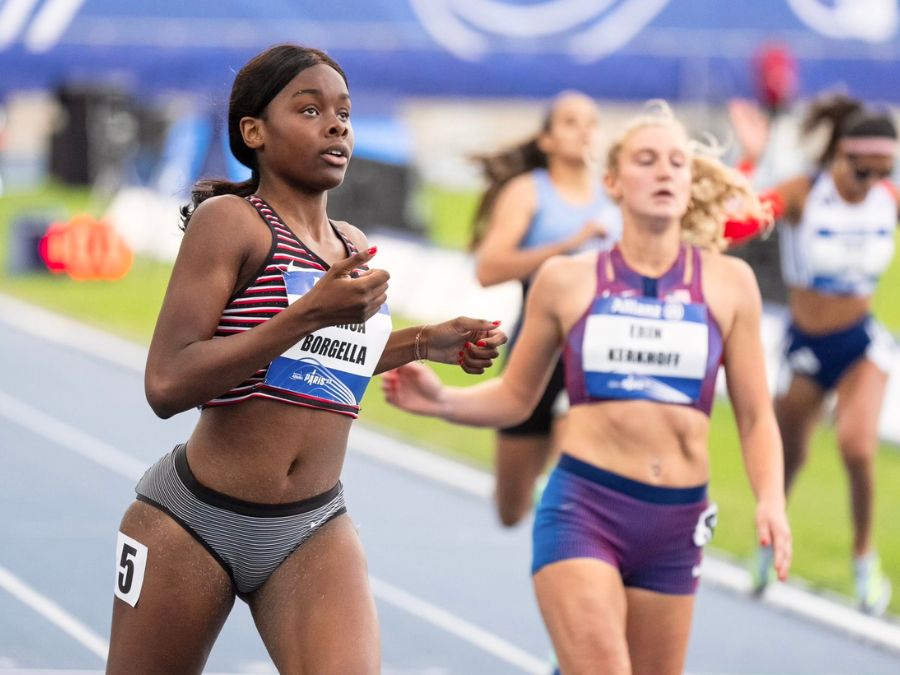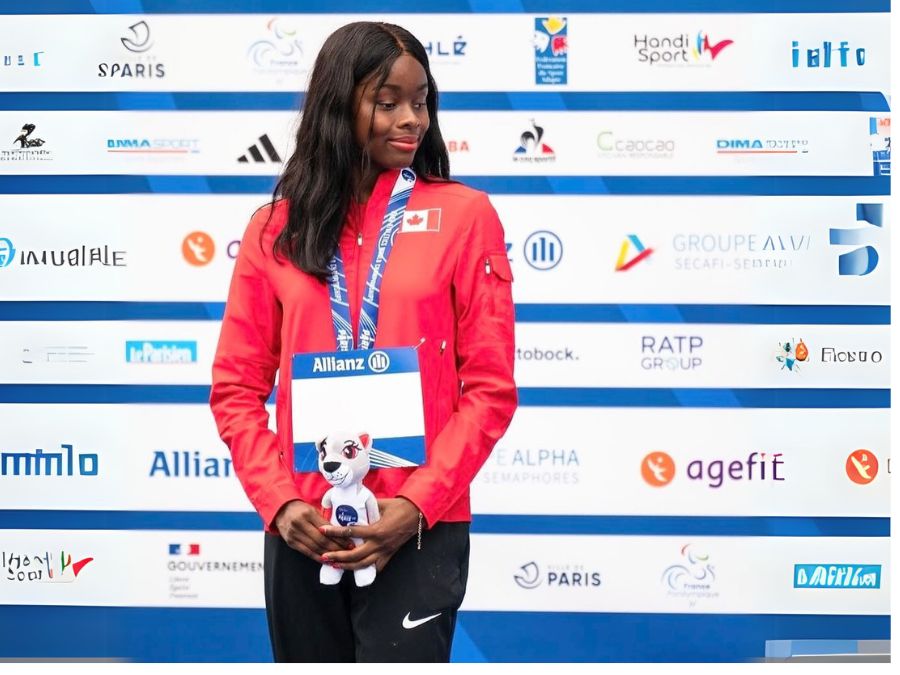In our RT Snap Q&A series, we’ve had the privilege of interviewing some of the world’s best runners, delving into their extraordinary journeys, celebrating their achievements, and exploring the unwavering dedication that defines their careers.
Bianca Borgella
- Born: January 10, 2003
- Nationality: Canadian
- Para-athlete

Personal Bests
- 100 Metres – 11.92
- 60 Metres – 7.65
- 200 Metres – 24.39
- 4×200 Metres Relay Short Track – 1:43.07
- 4×200 Metres Relay – 1:42.57
- 200 Metres – 25.21
- 300 Metres – 41.84
- 400 Metres – 60.84
RT: Can you share the moment when you realized you wanted to pursue para-athletics at a competitive level? Was there a specific person or event that inspired you?
Bianca: The moment I realized I wanted to pursue para-athletics competitively was deeply personal and transformative. A friend I met during my first year of university played a pivotal role. She noticed my talent in track and field and encouraged me to explore the para-athletics community. At the time, I was aware of it but wasn’t interested. Her unwavering belief in my potential, however, pushed me to reconsider. She told me I had so much to offer and urged me to take that leap.
View this post on Instagram
This friend, who was a true fighter, inspired me not just in athletics but in life. She battled cancer with incredible resilience and strength. Her journey reminds me every day to keep fighting—to persevere and strive for excellence no matter the challenges I face. Her influence is embedded in my journey, and I dedicate much of my success to her memory. She continues to inspire me to push my limits, not only for myself but for the legacy of her fighting spirit.
RT: Your performance at the 2023 World Para Athletics Championships was outstanding. What did winning two medals in Paris mean to you personally and as a representative of Canada?
Bianca: Representing Canada at the 2023 World Para Athletics Championships was an unforgettable experience. Wearing the Canadian flag on my uniform was an honor in itself, but winning two medals made the journey even more meaningful. As it was my first time competing at the World Championships, I didn’t set high expectations for myself, focusing instead on enjoying the experience and learning from it.
View this post on Instagram
Returning home with medals, however, was a profound moment of joy and pride. It wasn’t just about the accolades—it was about knowing I had made my country proud and demonstrated what perseverance and hard work can achieve. It reinforced my belief in my ability to compete at the highest level and motivated me to continue striving for more.
RT: What does a typical training day look like for you? Are there specific routines or techniques you focus on to stay at peak performance?
Bianca: A typical training day for me begins early in the morning. I’ve found that starting my day with a workout sets the tone for productivity and focus. Morning sessions allow me to dedicate my afternoons and evenings to schoolwork and recovery, creating a balanced routine that supports both my athletic and academic goals.
My workouts are carefully structured to target my performance needs, focusing on speed, endurance, and technique. Post-training, I make time for therapy and recovery to ensure my body stays in peak condition. I’m fortunate to train in an environment that is not only physically rigorous but also mentally uplifting. My training group and coaching staff foster a sense of community and positivity, which has allowed me to feel at peace while pushing my limits. This balance of discipline, support, and self-care is key to my success.
RT: Can you describe a moment in your career when you faced a significant setback or challenge? How did you overcome it, and what did it teach you about resilience?
Bianca: I’ve faced several significant setbacks in my career, both mentally and physically. One of the most challenging mental hurdles has been dealing with people who sought to take advantage of my success. As a high-level athlete, I’ve had access to opportunities and resources that some people tried to exploit, which was disheartening and impacted my confidence. However, I used that pain as fuel to become stronger and more independent, proving to myself and others that I could pave my own path without shortcuts or external validation.
View this post on Instagram
Physically, my most significant challenge occurred in 2024 when I suffered a glute injury that escalated into a hamstring injury just months before the Paralympics. Despite the pain and frustration, I trained diligently to prepare for the competition. In the Paralympic final, I re-injured my hamstring but chose to finish the race, even through tears. That moment could have marked the end of my career, but instead, it became a testament to my resilience. It reminded me that setbacks, while painful, are opportunities to grow stronger. I’m now preparing for the next Paralympics and setting my sights on competing in the Olympics as well.
RT: Who are the key people in your support system, and how have they helped shape your journey as an athlete?
Bianca: My support system is built on the unwavering encouragement of my family, friends, and coach. My parents, despite not always being physically present, always make the effort to call me before and after races, cheering me on and reminding me of their belief in my abilities. On days when motivation wavers, they’ve pushed me to keep training and striving for my goals.
View this post on Instagram
My best friend has been a cornerstone of my mental and emotional well-being, offering encouragement at every stage of my journey. And my coach plays an irreplaceable role, believing in my potential when others might not. He sees me not just as a para-athlete but as a complete athlete, which has been instrumental in shaping my confidence and self-perception.
Together, these individuals have created a network of support that allows me to thrive both on and off the track.
RT: What has been the most memorable race of your career so far, and why does that particular race stand out to you?
Bianca: The most memorable race of my career has to be the Paralympic final. Initially, I saw it as a disappointment—I pulled my hamstring mid-race, fell, and thought I had failed. At that moment, I was devastated and ready to give up on the sport entirely. But when I look back, I realize that race represents my true character.
Despite the injury and tears, I got up and finished the race. That moment reminded me that resilience isn’t just about physical strength; it’s about mental fortitude and the refusal to quit, no matter how difficult the circumstances. The race has since become a symbol of who I am as an athlete and as a person—someone who keeps fighting, who rises after every fall, and who is determined to keep pushing forward.
RT: What advice would you give to young athletes with disabilities who aspire to compete at an elite level? Are there specific lessons or values you’d like to share from your own journey?
Bianca: My advice to young athletes with disabilities is to never let your disability define you. People may see you only through the lens of your limitations, but you must see yourself as more than that. You are not just an athlete with a disability—you are an athlete, period. Believe in your abilities, and surround yourself with people who see your potential and want to see you grow.
View this post on Instagram
Find a coach and an environment that supports you as a whole person, not just as an athlete. Understand that your limitations are not barriers; they are challenges that can make you stronger. Embrace them, learn from them, and use them to fuel your growth. Pursuing a career in elite sports isn’t just about physical achievement; it’s about building resilience, confidence, and a sense of self-worth. Remember, the journey is just as important as the destination.




